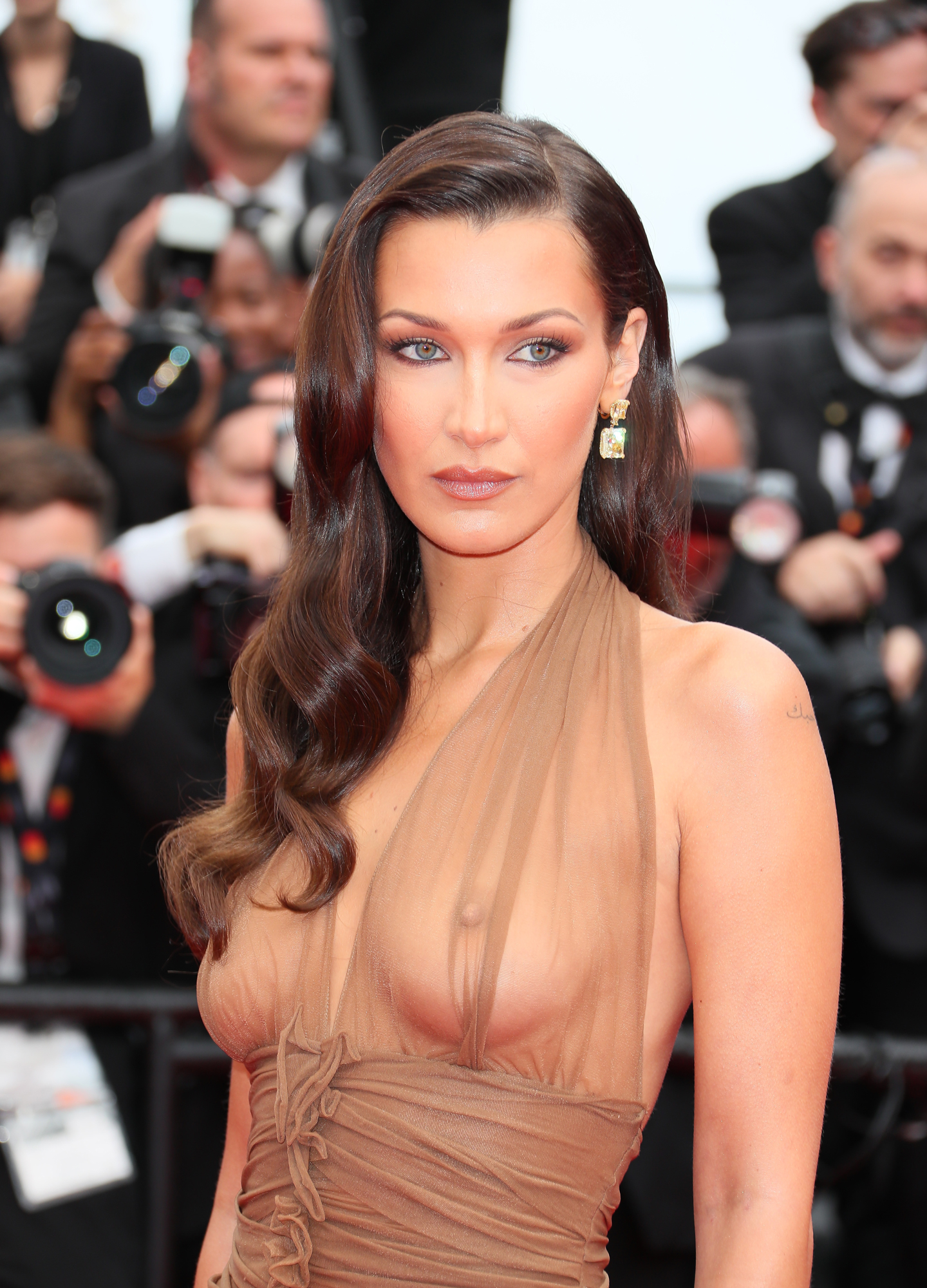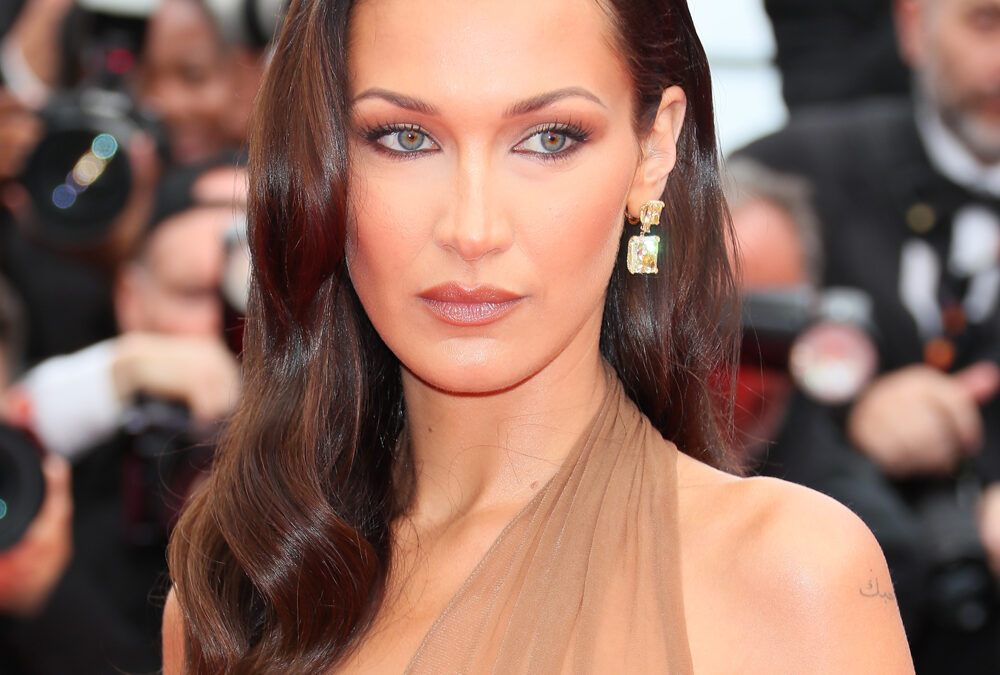Why Are People So Outraged At Bella Hadid For Wearing A ‘Naked’ Dress?
Words by Chloe Laws

‘Put it away.’ ‘What’s happened to the world?!’ ‘Dangerous!!’ You’d think these would be remarks made at, I don’t know, someone brandishing a machete in public or a person flashing their genitals on public transport. You’d be mistaken. These comments were made over Bella Hadid wearing a sheer dress! And these were some of the more palatable comments out there.
Hadid attended the premiere of The Apprentice at Cannes Film Festival this week in a latte-brown mesh dress by Saint Laurent. The dress was sheer around the bust, and her boobs were visible – not ‘on display’ or being ‘flaunted’ as the tabloids would say – simply, there. She looked amazing, but that’s beside the point. People were not happy about *checks notes* her having a body and it being visible.
Sadly, this backlash comes as no surprise. Women cannot exist without being criticised, sexualised, demonised or chastised. Especially when in public, especially when high-profile, especially when seemingly confident. It does not matter what you look like, you will be dubbed too much or too little. Too revealing, too modest, too pious, too slutty, too fat, too thin, too beautiful, too ugly, too feminine, too masculine. Whoever the woman, whatever the outfit, there will be criticism. Even Bella Hadid, an embodiment of most Western beauty standards and a literal supermodel.
It happens constantly. CMAT, an Irish singer, attended the Brit Awards in March this year wearing a fun Sophie Lincoln dress that had a low back and showed her bum crack. She looked amazing, but that’s once again, beside the point. She was body shamed, slut shamed, everything-shamed. Appearing on Radio 4’s Woman’s Hour, CMAT spoke about the ordeal, saying: ‘I only think that my derrière caused a ruckus because it is larger. There were a lot of bits of crack shown in the early 2000s and stuff, but it didn’t necessarily cause a stir. I think mine did because I’m a size 14 as opposed to a size six, which I suppose is commonly what we do see on television.’
We all remember when Rose McGowan attended the 1998 VMA in a sheer chain-mail dress, right? It was an iconic fashion moment, and she looked amazing, but that’s once more, beside the point. In 2020, she spoke about the public shaming she received. ‘They slut-shamed me like crazy. It was kind of hard. I hadn’t really ever dealt with global media shaming. But it prepared me for later on it happening to me a whole bunch. It was also like, ‘Sorry you’re square and I’m not. Bummer.’
‘We are so immune to this level of misogyny and shaming that it often does not feel ‘worth it’ to call out.’
McGowan’s dress was worn for meta reasons, a reclamation of sorts. She said, ‘It was my first big public appearance after being sexually assaulted. I just felt like, “Oh Hollywood, would you want a body just that you can use and throw away? Then I’ve got one for you!” It was like at the end of ‘Gladiator’ when he comes out and he’s like, ‘”Are you not entertained?”’
McGowan understood the hypocrisy and the patriarchal trap: people are comfortable when women’s bodies are ‘on display’ if they are not the person choosing to do the displaying. Our nudity is fine, if it’s not autonomous. Sheer dresses are great, if it’s a male director is in the chair dictating it so. Then, it’s art. Sheer dresses are fine in porn, in non-consensual AI deepfakes of celebrities, in anime – so long as men feel some sort of power. We are constantly sexualised and then demonised for being sexual, told to be sexy and ‘look’ a certain way, but scolded when doing so.
Last summer, in July 2023, Keke Palmer was shamed publicly by her child’s father Darius Jackson – and half the internet – for wearing a sheer dress whilst attending an Usher concert. ‘It’s the outfit tho [sic]… you a mom,’ Jackson tweeted. In one short statement she was sexualised and desexualised; the sheerness of her outfit dubbed inappropriate because she is a mother, and therefore not allowed to be sexy. Palmer was reduced to a one-dimensional being, and whilst she got a lot of support, many agreed with Jackson’s misogyny.
There are so many expectations of how women should look and dress, and they are incredibly limiting and contradictory. It’s a lose-lose. Women who choose to dress modesty are often told they are being oppressed and controlled. Women who do not dress modestly are told they are whores and looking for male attention. These judgements roll in by the bucket load, and we are so immune to this level of misogyny and shaming that it often does not feel ‘worth it’ to call out. We rarely tap the sign and say the quiet bit out loud which is: misogyny is the problem here, not how women dress.
Photo:Ashlee Huff

